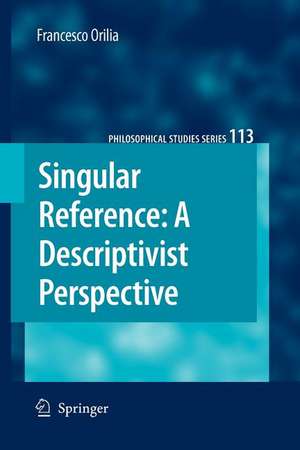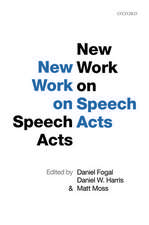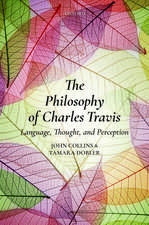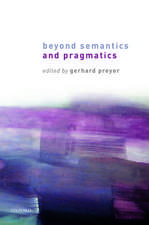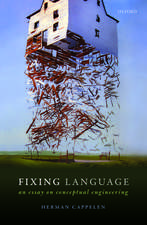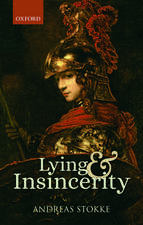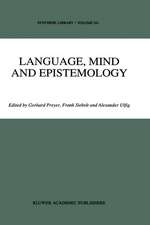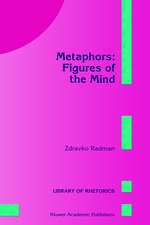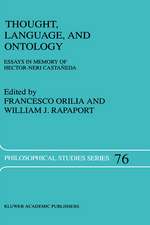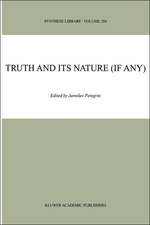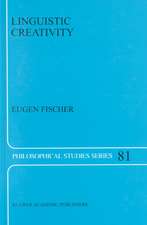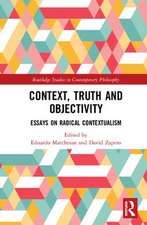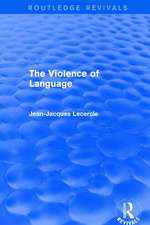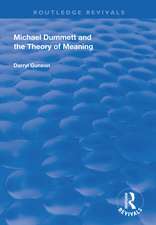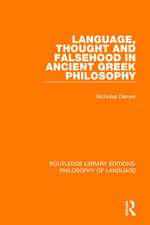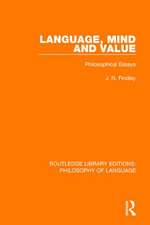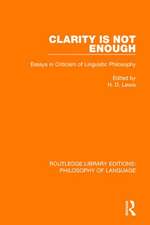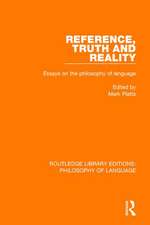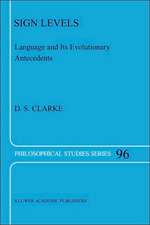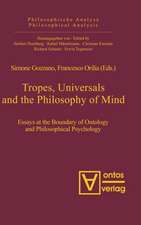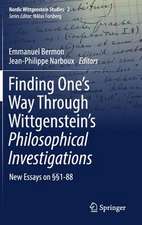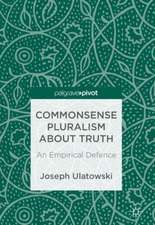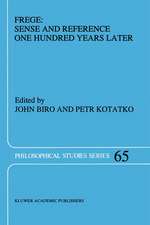Singular Reference: A Descriptivist Perspective: Philosophical Studies Series, cartea 113
Autor Francesco Oriliaen Limba Engleză Paperback – 14 mar 2012
This work will be of interest to researchers in philosophy of language, philosophy of mind and theoretical linguistics. The wealth of background information and detailed explanations that it provides makes it also accessible to graduate and upper level undergraduates and suitable as a reference book.
| Toate formatele și edițiile | Preț | Express |
|---|---|---|
| Paperback (1) | 944.99 lei 6-8 săpt. | |
| SPRINGER NETHERLANDS – 14 mar 2012 | 944.99 lei 6-8 săpt. | |
| Hardback (1) | 950.96 lei 6-8 săpt. | |
| SPRINGER NETHERLANDS – 10 dec 2009 | 950.96 lei 6-8 săpt. |
Din seria Philosophical Studies Series
-
 Preț: 407.78 lei
Preț: 407.78 lei - 15%
 Preț: 644.95 lei
Preț: 644.95 lei - 18%
 Preț: 1120.18 lei
Preț: 1120.18 lei - 18%
 Preț: 1005.43 lei
Preț: 1005.43 lei - 15%
 Preț: 640.06 lei
Preț: 640.06 lei -
 Preț: 381.21 lei
Preț: 381.21 lei -
 Preț: 391.61 lei
Preț: 391.61 lei - 15%
 Preț: 640.88 lei
Preț: 640.88 lei - 15%
 Preț: 639.25 lei
Preț: 639.25 lei - 18%
 Preț: 1221.51 lei
Preț: 1221.51 lei - 18%
 Preț: 947.18 lei
Preț: 947.18 lei - 18%
 Preț: 955.56 lei
Preț: 955.56 lei - 18%
 Preț: 950.96 lei
Preț: 950.96 lei - 15%
 Preț: 645.47 lei
Preț: 645.47 lei - 15%
 Preț: 641.38 lei
Preț: 641.38 lei - 15%
 Preț: 644.82 lei
Preț: 644.82 lei - 18%
 Preț: 950.66 lei
Preț: 950.66 lei -
 Preț: 386.00 lei
Preț: 386.00 lei - 15%
 Preț: 644.82 lei
Preț: 644.82 lei - 15%
 Preț: 642.18 lei
Preț: 642.18 lei - 15%
 Preț: 643.48 lei
Preț: 643.48 lei - 15%
 Preț: 638.76 lei
Preț: 638.76 lei - 20%
 Preț: 553.25 lei
Preț: 553.25 lei - 20%
 Preț: 560.30 lei
Preț: 560.30 lei - 18%
 Preț: 951.29 lei
Preț: 951.29 lei - 18%
 Preț: 893.40 lei
Preț: 893.40 lei - 20%
 Preț: 566.75 lei
Preț: 566.75 lei - 18%
 Preț: 951.77 lei
Preț: 951.77 lei
Preț: 944.99 lei
Preț vechi: 1152.43 lei
-18% Nou
Puncte Express: 1417
Preț estimativ în valută:
180.84€ • 187.66$ • 151.15£
180.84€ • 187.66$ • 151.15£
Carte tipărită la comandă
Livrare economică 17-31 martie
Preluare comenzi: 021 569.72.76
Specificații
ISBN-13: 9789400730984
ISBN-10: 9400730985
Pagini: 304
Ilustrații: XIV, 290 p.
Dimensiuni: 155 x 235 x 16 mm
Greutate: 0.43 kg
Ediția:2010
Editura: SPRINGER NETHERLANDS
Colecția Springer
Seria Philosophical Studies Series
Locul publicării:Dordrecht, Netherlands
ISBN-10: 9400730985
Pagini: 304
Ilustrații: XIV, 290 p.
Dimensiuni: 155 x 235 x 16 mm
Greutate: 0.43 kg
Ediția:2010
Editura: SPRINGER NETHERLANDS
Colecția Springer
Seria Philosophical Studies Series
Locul publicării:Dordrecht, Netherlands
Public țintă
ResearchCuprins
Introduction: Referentialism vs. Descriptivism.- Background Notions.- Why Descriptivism Was So Successful.- Why Referentialism Is So Successful.- Definite Descriptions and Proper Names.- Indexicals.- Tense, Temporal Indexicals and Other Miscellaneous Issues.- Conclusion: Accounting for the Referentialist DataReferentialist data .
Recenzii
“Orilia’s volume, which for the detailed analysis of the problems and for the originality and the insights of the advanced solutions represents one of the most recommended texts for those who are interested in the debate between Descriptivism and Direct Reference Theory about singular reference devices.” (Aldo Frigerio, Axiomathes, Vol. 27, 2017)
Notă biografică
Francesco Orilia studied philosophy at the university of Palermo (M.A., 1979) and then, after being granted a Fulbright grant, at Indiana University, Bloomington (Ph.D., 1986), where he was a student of Hector-Neri Castañeda, Nino B. Cocchiarella and J. M. Dunn. From 1987 to 1994 he was a researcher in artificial intelligence at the Olivetti research lab in Pisa and from July 1994 to July 1997 a researcher/lecturer in theoretical philosophy at the University of Cagliari. Since August 1997 he has been with the university of Macerata where he is currently professor of philosophy of language. He also had visiting positions at Indiana University, Bloomington (1986), University of Paris IV (2005), University of Iowa at Iowa City (2006), Cambridge University (2008). In the period 2000-2003 he was a member of the selection committee of the E. W. Beth Dissertation Prize for logic, language, and information and he is now in the editorial board of Metaphysica. He has written or co-edited a few books and published many papers in international journals such as Dialectica, Journal of Philosophical Logic, Journal of Symbolic Logic, Notre Dame Journal of Formal Logic, Minds and Machines, Synthese, Topoi.
Textul de pe ultima copertă
Singular reference to ourselves and the ordinary objects surrounding us is a most crucial philosophical topic, for it looms large in any attempt to understand how language and mind connect to the world. This book explains in detail why in the past philosophers such as Frege, Russell and Reichenbach have favoured a descriptivist approach to this matter and why in more recent times Donnellan, Kripke, Kaplan and others have rather favoured a referentialist standpoint. The now dominant referentialist theories however still have a hard time in addressing propositional attitudes and empty singular terms. Here a way out of this difficulty emerges in an approach that incorporates aspects of the old-fashioned descriptivist views of Frege, Russell and Reichenbach without succumbing to the anti-descriptivist arguments that back up the current referentialist trend. The resulting theory features a novel approach to the semantics and pragmatics of determiner phrases, definite descriptions, propernames and indexicals, all treated in uniform fashion in both their anaphoric and non-anaphoric uses.
This work will be of interest to researchers in philosophy of language, philosophy of mind and theoretical linguistics. The wealth of background information and detailed explanations that it provides makes it also accessible to graduate and upper level undergraduates and suitable as a reference book.
This work will be of interest to researchers in philosophy of language, philosophy of mind and theoretical linguistics. The wealth of background information and detailed explanations that it provides makes it also accessible to graduate and upper level undergraduates and suitable as a reference book.
Caracteristici
Detailed presentation of singular reference, which, by examining carefully the pros and cons of the two main rival approaches, descriptivism and referentialism, provides a broad survey of this topic This survey can work both as an introduction for the non-expert and a useful synopsis for the expert Proposal of an original descriptivist account of singular reference capable of answering to all the objections that the referentialists have put forward against descriptivism The proposed theory, by relying on its descriptivist underpinnings, also provides a unified account of anaphoric and indexical uses of pronouns
